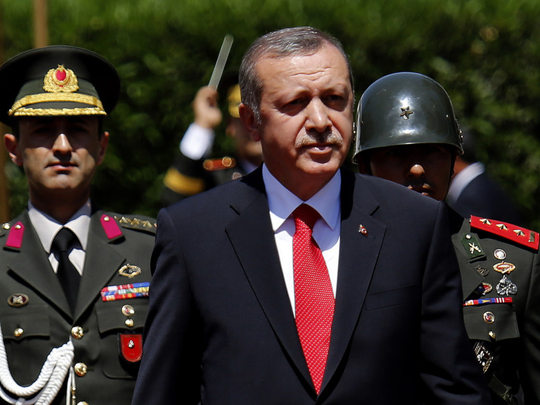
Because Kurds were spread over a vast swath of land in Anatolia and because of weak leaders who failed to take firm stands with the allies carving the remnants of the Ottoman Empire at the end of the First World War, one of the clauses of the 1920 Treaty of Sevres, which called for the creation of Kurdistan, was never implemented.
Kurdish nationalism was stifled, replaced by the 1923 Treaty of Lausanne that settled various conflicts between allied forces and the nascent Republic of Turkey under Mustafa Kemal Ataturk. Lausanne defined the borders of modern Turkey and enslaved millions of Kurds — who simply became known as “Dagh Turklari” [Mountain Turks], forbidden to use their own language, sing their own songs, or wear traditional costumes in the cities. It further truncated Kurds by adding their lands into British-controlled Iraq and French-controlled Syria. Many found refuge in Iran and Armenia as well.
The dust settled between Ankara and Baghdad in July 1926 when their border was delineated and in 1961 between Ankara and Damascus, although the latter was largely drawn by the infamous Sykes-Picot agreement, secretly inked in 1916. Syria was powerless when France transferred Alexandretta [now Hatay Province] to Turkey in 1939, and while it reluctantly accepted the colonial decision, Damascus merely postponed whatever actions it contemplated to rescind the annexation.
After the 1980 coup d’etat, Ankara opened new channels of communication with senior Baath Party officials, largely to persuade the latter to end their support of Kurdistan Workers’ Party (PKK) nationalists, who first staged their armed struggle in 1984. Relations between Turkey and Syria remained lukewarm until Recep Tayyip Erdogan entered the scene. As ties improved, and in what was a surprising move, Damascus expelled the head of the PKK, Abdullah Ocalan, in 1998. The latter was arrested in 1999 by Turkish security forces in Nairobi, Kenya, repatriated, tried and jailed for life.
Whatever the merits of their actions, and in the light of significant political bridges established between the ruling Justice and Development Party (AKP) and Baath minions, both then Prime Minister Erdogan and President Bashar Al Assad forged ahead. When Syrians rose up against the dictator in early 2011, Erdogan counselled his favourite protege — the two men and their wives vacationed together — to change course and concede a few cosmetic demands. In the event, Al Assad opted to destroy his country to stay in power, which angered Erdogan not only because the younger Damascene rejected his counsel, but also because Erdogan’s Sunni aspirations could not possibly be built on Syrian corpses. Inevitably, the Turk opened his borders to millions of refugees and, more importantly, to volunteers anxious to fight Al Assad.
Notwithstanding denials, Turkish officials looked the other way as “pipelines” were established to supply terrorists engaged in their “divine duties”, including armed men that fled the Syrian Arab Army. Even the country’s National Intelligence Organisation — which was in the news this week for its connection with the January 9, 2013, murders of three Kurdish leaders in Paris, France — apparently armed at least one of the groups fighting in Syria. Ankara acknowledged that it backed the Ahrar Al Sham, a relatively mainstream Salafist association, although plenty of evidence existed that other groups, including the Jabhat Al Nusra and Daesh (the self-proclaimed Islamic State of Iraq and the Levant) received assistance as well.
For nearly four years, Turkey played a cat-and-mouse game along its porous, 700km border with Syria, seemed unfazed when extremists laid siege to Kobani in 2014, refused its Nato allies permission to use the Incirlik Air Base and otherwise insisted that the international coalition led by the US create a no-fly zone that, presumably, would limit Syrian Air Force engagements near Aleppo. What changed recently was not due to last week’s suicide-bomber who killed 32 young Kurds or the death of several soldiers caught in crossfire. Rather, what changed was the setback associated with the AKP’s huge losses during the last elections and, it is worth noting, significant gains recorded by the Kurdish-led Peoples’ Democratic Party (HDP) that entered parliament for the first time with 80 of the 550 seats.
Disingenuous in his assessments, Erdogan now claims that there are no differences between Daesh and the PKK, which Ankara still considers to be a terrorist organisation. In fact, the AKP telegraphed the news that the PKK must choose between arms and democracy, which is easy, although an inability to come to terms with the HDP’s growing influence probably led him to embark on yet another losing campaign. For no matter how convoluted Erdogan’s rationale may be, the decision to go after the Syrian Kurdish fighters aligned with the PKK, the Democratic Union Party (PYD) of Syria, Ankara is now displaying its real intentions.
Thirty-years after the Kurdish insurgency started, Turkey was still reluctant to grant its “Dagh Turklari” the self-governance that is surely coming. The question for Bashar Al Assad’s mentor is whether this will be done democratically and peacefully or through a prolonged and bloody war.
Dr Joseph A. Kechichian is the author of the forthcoming Iffat Al Thunayan: An Arabian Queen, London: Sussex Academic Press, 2015.








